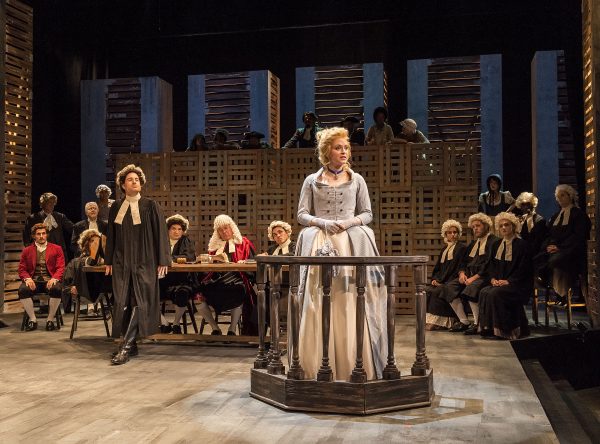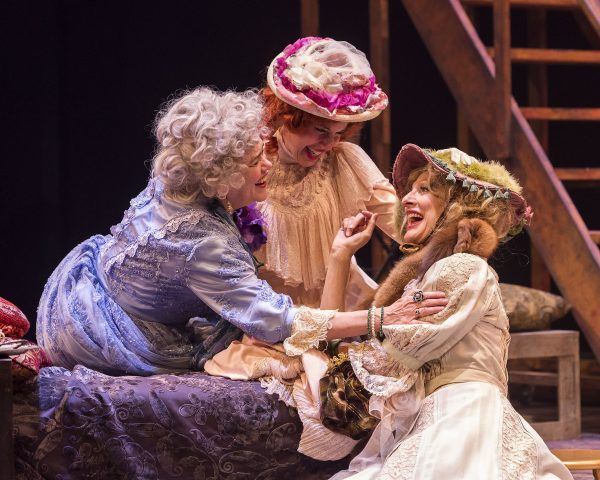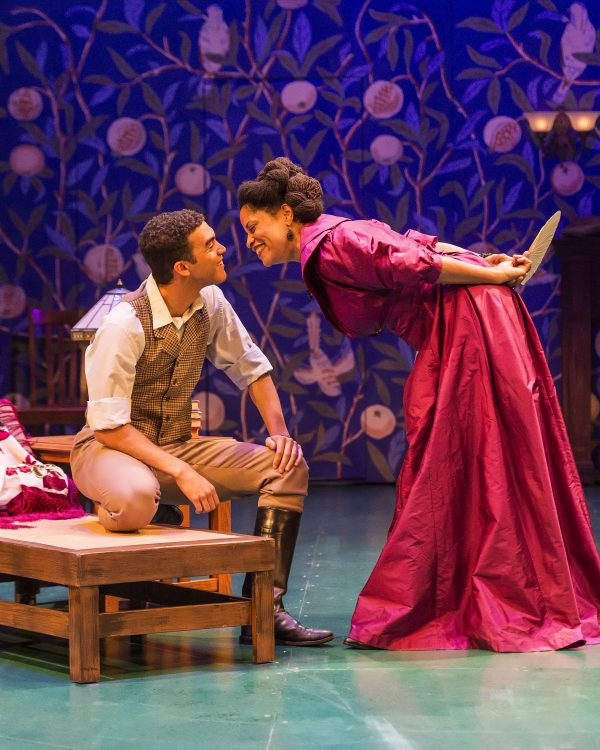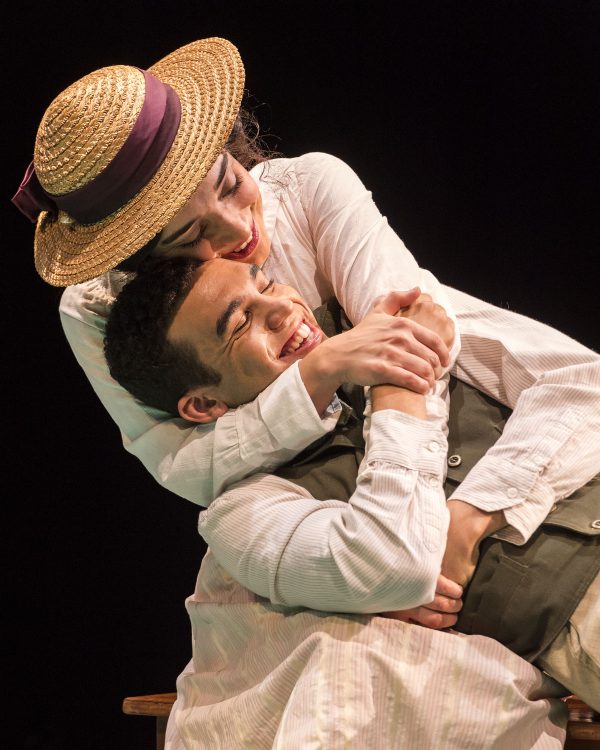[alert type=alert-white ]Please consider making a tax-deductible donation now so we can keep publishing strong creative voices.[/alert]
About three weeks ago I wrote a piece about how theatre, which often leads in this area, is responding to the political turmoil that’s engulfing our country. It took a while, but we’re pretty much there.
A surprise came, however, when I caught up with the triple season openers at A Noise Within (ANW). Who knew it would take plays going back to the last century and beyond, by a Frenchman and a three Brits, to bring home the realities of our current American disturbances? The trio of classics, presented in rotating rep, offers Giraudoux’ The Madwoman of Chaillot, Shaw’s Mrs. Warren’s Profession and a brilliantly condensed Michael Poulton adaptation of Charles Dickens’ A Tale of Two Cities. The tentacles of each play reach deep into our current crises.
Oh yes, there are differences in thrust, durability, loquaciousness, action and caliber among these three plays and their productions. A Tale of Two Cities bristles with action and humanity, broadly displayed against the violent backdrop of a French Revolution derailed by infighting and the stench of blood and indiscriminate slaughter. Poulton’s adaptation is a marvel of condensation, at once pugnacious, swift, tender and vivid. Its pace is punctuated by Fred Kinney’s transformable block set, consisting mostly of rough-hewn blocks that become anything from horse-drawn carriages to tribunals — and by Robert Oriol’s sweeping original music.

Staged by ANW’s Artistic Co-Directors, Julia Rodriguez-Elliott and Geoff Elliott (the latter unable to resist taking on a handful of minor roles in this one and doing them well), it shows us how easily good intentions can go awry and turn into horrific nightmares. It is a vigorous and invigorating experience with a very large cast. The swirling performance covers its ground in a breathless couple of hours that deeply satisfy and leave an audience much to ponder and discuss in their wake.
Madwoman of Chaillot, written in 1943, when France was swarming with uninvited Germans, takes a more indirect and civilized path to its protest, using wit and a broad attack on insidious and blundering bureaucracies to upend the parasites in its midst. Giraudoux’ weaponry consists of the eccentricities and shrewdness of a trio of ditzy elderly denizens of another kind of Paris underground who, replete with an unrelinquished dead dog, manage to outsmart the plotting of a greedy clutch of self-aggrandizing financiers.
The three women — Susan Angelo and Jill Hill playing the Madwomen of Passy and St. Sulpice, respectively, with the powerful Deborah Strang as the titular Countess Aurelia, the Madwoman of Chaillot — are all resident artists with ANW. Their pixilated antics are the highlight of this production and the purest evidence that this kind of company familiarity can, under the right circumstances, breed exhilarating theatre.

The play is otherwise overwritten and overpopulated, which was the style in its day, and would benefit from a good, sensitive haircut. But the smart Giraudoux language still makes its points in spite of Maurice Valency’s dated English version that has had a stranglehold on the play’s rights of translation for far too long.
Stephanie Shroyer’s staging attempts to accommodate the length, but adds to the problem with some distracting choreography used to negotiate scene changes with Angela Balogh Calin’s scaffolded block setting. Shroyer’s efforts are best realized, however, in the one joyfully mad scene when Aurelia’s equally mad friends (and their invisible dog) come to tea and the three of them, later joined by a fourth (Veralyn Jones), giggle and squeal like twelve-year-old schoolgirls as they snag their unsuspecting prey.

Leave it to George Bernard Shaw and his Mrs. Warren’s Profession, written in 1893 but not performed until nine years later, to emerge as the most contemporary and modern playwright of the three. This pointed comedy feels written yesterday with a clarity of vision and unassailable logic that should put every lingering Puritan to shame.
The comedy had a rocky start in its day because it justifies the life choice made by a prostitute, our Mrs. Warren (a striking Judith Scott). With the self-interested financial participation of some of her male companions, she becomes the wealthy proprietress of an international string of brothels that she runs with model efficiency. She has a daughter, Vivie (Erika Soto) whom she has shielded from this truth and has sent to the very best schools. Complications arise when, thanks to a vindictive slip by one of Mrs. Warren’s investors, the truth of how her mother made the money that paid for those schools catches up to Vivie, creating — in Vivie’s self-righteous eyes — an insurmountable barrier to any relationship with that mother.
Shaw’s point, that it was not “moral failure” that drove Mrs. Warren into prostitution, but poverty and an absence of economic alternatives, is still alive and well. Not enough has changed since then. Some people might say nothing has. When it comes to sex, we still seem to love blaming the victim. When the play finally had its American premiere in 1905, the police arrested the cast and crew on opening night before discovering that the production was not breaking any laws, unless it was the law of narrow-mindedness. Aside from Shaw’s unmatched discursive talents the other reason why Mrs. Warren is still so playable today, is that his arguments are evergreen. No aging there. His characters are as convincing as ever.
This is red meat to director Michael Michetti, and his production is expertly paced and finely cast. Scott’s outstanding Mrs. Warren exudes the right soupçon of vulgarity, to remind us of her street beginnings seen through a thin veneer of grandeur and assumed respectability. Those vestiges are never so apparent as when the lioness in her is called upon in self-defense — and in the controlling ease she demonstrates around the men who are not so much her friends (perhaps past lovers as well), but above all her valued business partners in a lucrative enterprise that she carries off with panache. Next to her, the well brought up Vivie comes off as more than a bit of a prig.

Last season was ANW’s 25th, in itself a notable achievement in this most perilous and precarious of the arts. These three productions represent a strong start to season 26 for a company that seems to have mastered that rarity: the twin challenge of achieving theatrical artistry and a well-tempered administration that understands the crucial importance of balancing both, while always valuing and respecting its audience. May they continue to prosper on all counts.
Top image: The cast of A Tale of Two Cities at A Noise Within. Tavis Doucette on the ground, center.
Photos by Craig Schwartz.
WHAT: The Madwoman of Chaillot, Mrs. Warren’s Profession, A Tale of Two Cities, performed in rotating repertory.
WHERE: A Noise Within, 3352 E Foothill Blvd, Pasadena, CA 91107
WHEN:
Madwoman: Sunday, 11/5, 2 & 7pm; Saturday, 11/11, 2 & 8pm.
A Tale of Two Cities: Saturday, 11/4, 2 & 8pm; Thursday, 11/9, 7:30pm
Friday, 11/10, 8pm; Sunday, 11/19, 2 & 7pm.
Mrs. Warren’s Profession: Today, 7:30pm; Friday, 11/3, 8pm; Sunday, 11/12, 2 & 7pm; Friday, 11/17, 8pm; Saturday, 11/18, 2 & 8pm.
HOW: Single Tickets start at $25, available at www.anoisewithin.org or by phone at 626-356-3100. Student Rush with ID an hour before performance, $20; Groups of 10 or more: adults from $30/ticket, students from $18/ticket.
Save
Save
Save
